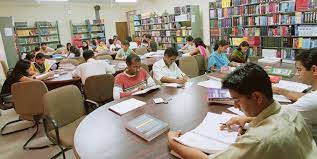Libraries are affected by digital reading, and many close as customers avoid them
There are several children sitting on the white stairs of the Asiatic Library in South Mumbai, which is close to Horniman Circle. While many people are taking pictures, others are making video reels for social media. Others are lounging on the stairs and taking in the views of the neighboring British-era structures. Of these, nobody even enters the building via the larger doors to have a peek inside. The Asiatic Library, like many other institutions, is a victim of public indifference despite housing one of the nation’s oldest public libraries. According to individuals in charge of these libraries, it is currently difficult to draw the public into public libraries.
Opening a book, smelling its pages for that intoxicating scent, finding a cozy spot, and settling up to read it all have a certain charm to them. This magic is addicting for readers. Public and private libraries have long served as welcoming locations for people to enjoy reading experiences. The thrill of opening a physical book is losing out to the digital experience as technology permeates the reading world. Public and private libraries are in danger of closing due to public indifference, a lack of funding, dwindling memberships, and a failure to reinvent themselves in the face of the digital competition.
Public libraries are vital institutions that serve as doors to knowledge, learning, and research. The months of April, May, and June are critical for membership renewals and new memberships at many public libraries. However, a significant number of these libraries shut down during the COVID-19 shutdown because to a lack of funding to operate the theme. After the lockout, memberships decreased as digital reading became more prevalent.
“Many libraries have seen a decline in readership. Why would anybody face Mumbai’s traffic to go to these libraries when literature are available at their fingertips? India’s public and private libraries are on the verge of extinction due to digital reading. Even many private libraries have closed, said Bhainand Manish, who ran one. “I announced that I intended to give away the books after closing the library, but not a single person showed up even for that. This demonstrates the negative effects of digital reading, claims Manish.
Due to public indifference, the 125-year-old Mumbai Marathi Granthalaya has failed. This library, which has a large collection of Marathi literature, is struggling to survive due to a number of issues, such as political meddling, a lack of funding, ongoing infighting among the members, and underpaid personnel. This library, which Sharad Pawar, the leader of the Nationalist Congress Party, has led for the last 30 years, is supported by the Mumbai Municipal Corporation, the wealthiest municipal organization in the nation.
According to a member of this library, the BMC is not interested in supporting this library since it is run by the NCP. “Politicians murdered this library, I tell you. This library’s whole property is dilapidated. The structure is beyond the point of repair or renovation. It has to be completely rebuilt, the source claims. Political rivals have turned the enormous area around this library into a point of dispute, each claiming the other is setting up a scenario to give this great site to developers.
“The site will be developed, and the library will be constructed. Readers have already stopped reading it. There won’t be a time limit for its reactivation after it has been shut down for renovation, the insider said. Due to a lack of readers, several of its branches have been closed. 29 of the 44 branches are currently operational. Only 21 of these are currently in use.
Despite the vast Marathi population, the library is in desperate need of patrons to remain open, which will ensure its future. Though several Marathi cinema and theater figures have indicated a wish to administer this library and revitalize it via cultural activities, reports claim that the politicians are not eager to hand it off.
This 1898-founded library comprises more than 6,45,569 Marathi volumes, many of which are rare and older than 200 years. The Mumbai Marathi Granthalaya has hosted intellectuals like Lokmanya Tilak and Dr. Babasaheb Ambedkar in the past.
Private benefactors and municipal corporations promoted public libraries in Maharashtra as part of the state’s attempts to provide education to all sections in both the rural and urban regions. Vinod Tawade, a former BJP minister, established a book village in the hamlet of Bhilari in the Kolhapur district of Maharashtra. Every home in this picturesque hamlet adjacent to the hill station of Mahabaleshwar that participated in this initiative had a library set up in the living room. Additionally, books might be donated here. However, according to accounts, since there was no corresponding money, the people lost interest in preserving it.
After the roof of the building collapsed, the Mahsala Public Library in Raigad district of Maharashtra spent an estimated Rs 3,00,000 drying books that were drenched in a storm. This library, which was damaged by various storms that the area has seen recently, features a number of Marathi encyclopedias, some of which contain Dr. Babasaheb Ambedkar’s lectures.
Many legislation were passed in the first three decades after Independence to support library-centered education. Public libraries in India have grown quickly during this time. Currently, roughly 18 states have passed their own legislation governing public libraries and their general management.
Numerous Bollywood films have highlighted the Asiatic Library, with its towering, regal white columns and broad white stairs. The renovated Town Hall, commonly known as the building, was constructed in 1804 by British barrister and jurist Sir James Mackintosh. It is a well-known location for study and reference. A severe funding shortage and a drop in membership have both affected this library. Other libraries in comparable circumstances include the NCPA, J. N. Petit, and David Sassoon, among others.
The biggest issue these facilities suffer, according to Mumbai resident Rohini Thitte, a frequent visitor to several libraries across the city, is a lack of innovation. “I use the library often. They failed to reinvent the reader and position themselves as a crucial option for the readers. These libraries have made an effort to maintain their historical significance, but they haven’t succeeded in finding a new audience. Books from all over the world and fresh reading encounters must be found. No library has taken any action to draw in new patrons or keep existing ones coming back, claims Thitte.
“The library movement needs to be reenergized,” says Shirish Kulkamat, a private benefactor who has been donating volumes to several private libraries. “So many people have urged me to give them money rather than books. The library culture in India has to be reinvented. It is just a matter of time until there are no libraries left, according to Kulkamat, with so many of them going down because they are unable to compete with computerized reading.







